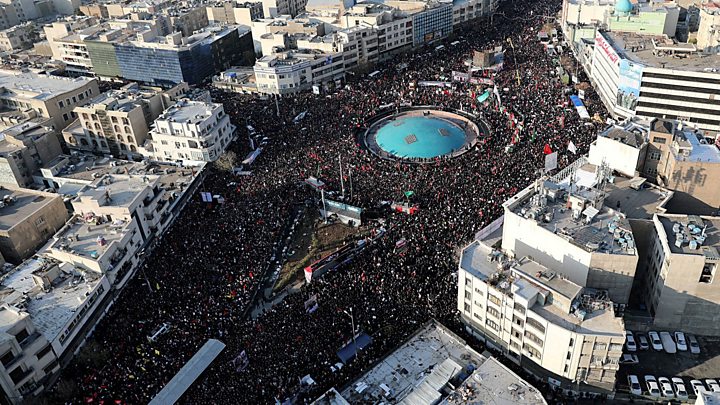Media playback is unsupported on your device
Huge numbers of black-clad mourners have turned out to pay their final respects to Iranian military commander Qasem Soleimani ahead of his burial.
Soleimani was assassinated in a US drone strike in Iraq on Friday, on the orders of President Donald Trump.
His body has now arrived in his hometown of Kerman in south-eastern Iran, where he is being buried on Tuesday morning.
Large crowds already turned out for a funeral procession in Tehran.
Iran has vowed "severe revenge" for the death of Soleimani and on Sunday pulled back from the 2015 nuclear accord.
Soleimani, 62, headed Iran's elite Quds Force, and was tasked with protecting and boosting Iran's influence in the Middle East.
In his homeland, Soleimani was hailed as a national hero and widely considered the second most powerful man in the country behind Supreme Leader Khamenei.
Media playback is unsupported on your device
But not all Iranians saw him in the same positive light.
He was a hardliner and a dominant force in a regime that shot dead scores of protesters at the end of 2019. He also spent vast sums building up alliances and militias in Lebanon, Yemen, Iraq and Syria at a time when US sanctions are impoverishing many Iranians, BBC Middle East editor Jeremy Bowen says.
Soleimani supported Syria's President Bashar al-Assad in the country's civil conflict, aided the Shia militant group Hezbollah in Lebanon, and guided Iraqi militia groups against the Islamic State group.
The US saw him as a terrorist, and President Trump said Soleimani was plotting "imminent" attacks on US diplomats and military personnel.
How was he mourned in Tehran?
State television showed huge crowds in Tehran for Monday's event. It said "millions" had shown up, although this figure is yet to be verified.
Mourners passed Soleimani's coffin over their heads and "death to America" chants were heard.

Media playback is unsupported on your device
Iran's Supreme Leader Ayatollah Khamenei led prayers and at one point was seen weeping.
Soleimani's remains were then taken to Qom, one of the centres of Shia Islam, where massive crowds also gathered for a ceremony, before the transfer to Kerman.
How have tensions escalated?
On Sunday Iran declared it would no longer abide by any of the restrictions imposed by the 2015 nuclear deal. The deal limited Iranian nuclear capacities in exchange for the lifting of economic sanctions.
Three European parties to the deal – Germany, France and the UK – urged Iran to stick to its terms.



